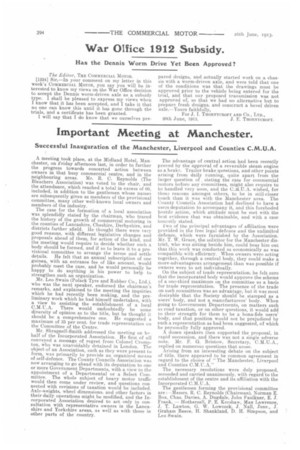Important Meeting at Manchester.
Page 20

If you've noticed an error in this article please click here to report it so we can fix it.
Successful Inauguration of the Manchester, Liverpool and Counties C.M.U.A.
A meeting took place, at the Midland Hotel, Manchester, on Friday afternoon last, in order to further the progress towards concerted action between owners in that busy commercial centre, and in the neighbouring areas. Mr. R. C. Reynolds (The Bleachers Association) was voted to the chair, and
the attendance, which reached a total in excess of 60, included, in addition to the gentlemen whose names
are subsequently given as members of the provisional committee, many other well-known local owners and members of the industry. The case for the formation of a local association was splendidly stated by the chairman, who traced the history of the growth of commercial motoring in the counties of Lancashire, Cheshire, Derbyshire, and districts farther afield_ He thought there were very good reasons, with different legislative changes and proposals ahead of them, for action of the kind, and the meeting would require to decide whether such a body should be formed, and if so to leave it to a provisional committee to arrange the terms and settle details. He felt that an annual subscription of one guinea, with an entrance fee of like amount, would probably meet the case, and he would personally be happy to do anything in his power to help to strengthen such an organization. Mr. Leo Swain (Polack Tyre and Rubber Co., Ltd.). who was the next speaker, endorsed the chairman's remarks, and explained to the meeting the inquiries which he had recently been making, and the preliminary work which he had himself undertaken, with a view to assisting the establishment of a local C.M.U.A. There would undoubtedly be some diversity of opinion as to the title, but he thought it should be a comprehensive one. He suggested a maximum of 33 per cent. for trade representation on the Committee of the Centre.
Mr. Shrapnell-Smith addressed the meeting on be half of the Incorporated Association. He first of all conveyed a message of regret from Colonel Crompton, who was unavoidably detained in London. The object of an Association, such as they were present to form, was primarily to provide an organized means of self-defence. The County Councils Association was now arranging to go ahead with its deputation to one or more Government Departments, with a view to the appointment of a Departmental or a Select Committee. The whole subject of heavy motor traffic would then comae under review, and questions connected with revisions of taxation would be included. Axle-weights, wheel dimensions, and other factors in their daily operations might be modified, and the Incorporated Association desired to act only in consultation with representative owners in the Lancashire and Yorkshire areas, as well as with those in other parts of the country. The advantage of central action had been recently proved by the approval of a reversible steam engine as a brake. Trailer-brake questions, and other points arising from daily running, quite apart from the larger question of stating the case for commercial motors before any committees, might also require to be handled very soon, and the C.M.U.A. wished, for those reasons amongst others, to be in still-closer touch than it was with the Manchester area. The County Councils Association had declined to have a users deputation to accompany it, and this foreboded hostile action, which attitude must be met with the best evidence that was obtainable, and with a case honestly stated.
Iwo of the principal advantages of affiliation were provided in the free legal defence and the unlimited defence, which were furnished by the Association. Mr. T. W. Grace, the solicitor for the Manchester district, who was sitting beside him, could bear him out that this work was conducted as economically as was compatible with efficiency. When owners were acting together, through a central body, they could make a more-advantageous arrangement than was possible if owners were to act individually.
On the subject of trade representation, he felt sure that the incorporated body would approve the scheme of a one-third maximum on the committee as a basis for trade representation. The presence of the trade on such committees was an advantage, but it was most desirable that the Society should be stamped as a users' body, and not a manufacturers' body. When going to Government Departments, on matters such as road taxation, or on other questions, it would add to their strength for them to be a bona-fide users' body, and that position would not be prejudiced by such a representation as had been suggested, of which he personally fully approved.
A dozen speakers then supported the proposal, in rapid succession, and there was not a single adverse note. Mr. F. G. Bristow, Secretary, C.M.U.A., replied on numerous questions that arose. Arising from an interesting debate on the subject of title, there appeared to be common agreement in regard to the choice of "The Manchester, Liverpool and Counties C.M.U.A."
The necessary resolutions were duly proposed, seconded and carried unanimously, with regard to the establishment of the centre and its affiliation with the Incorporated C.M.U.A.
The gentlemen forming the provisional committee are :--Messrs. R. C. Reynolds (Chairman), Norman E. Box, Chas. Davies, A. Dugdale, John Faulkner, E. J. Frank, — Hothersall, P. E. Kershaw, Max Lawrence, J. T. Lawton, G. W. Lowcock, J. Nall, Junr., J. Graham Reece, H. Shankland, D. H. Simpson, and Leo Swain.
































